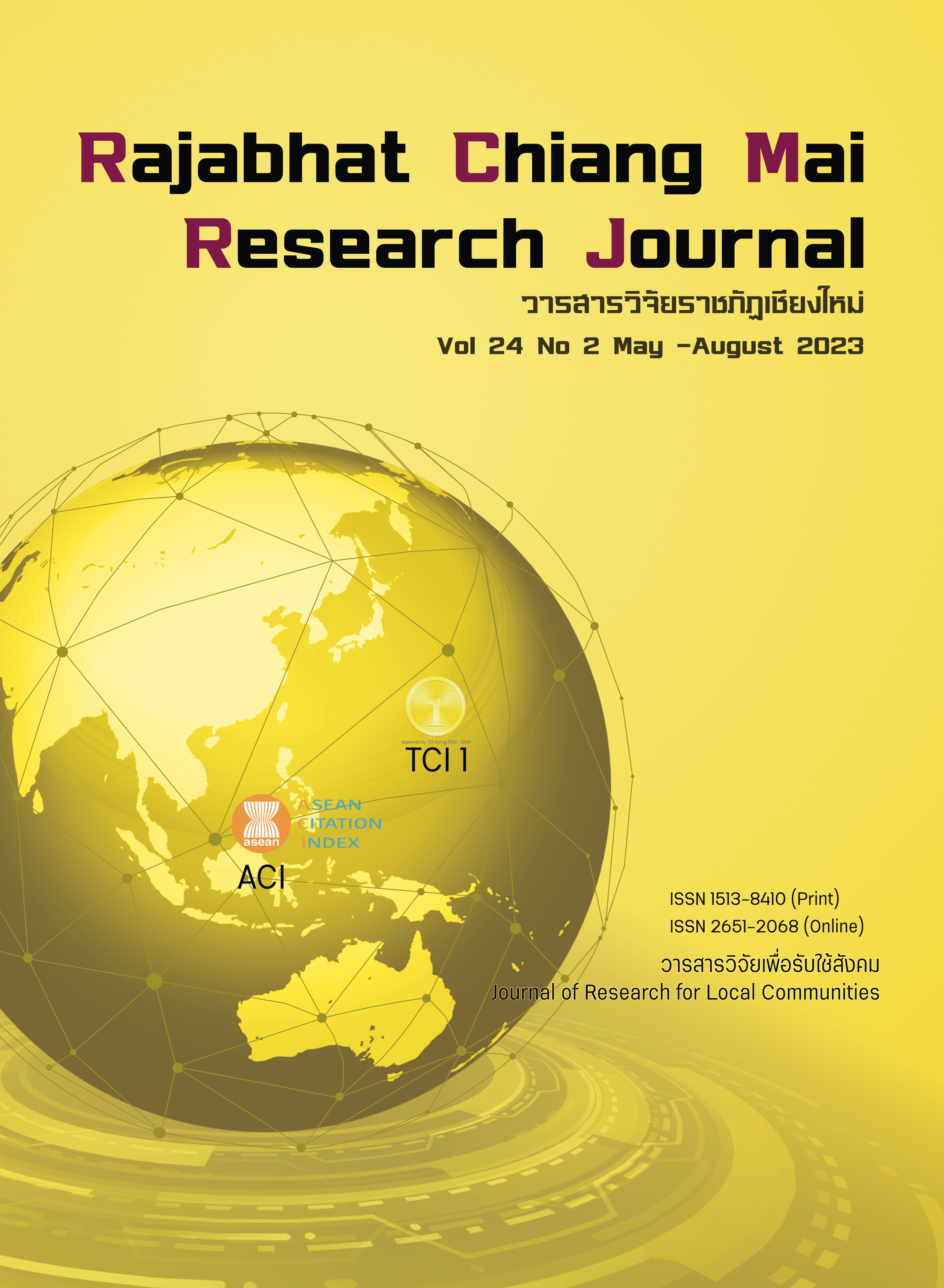Application of the MACRO Model Approach to the Interpretation Management of Creative Tourism in the form of Coffee in Khao Kho Sub-district Phetchabun Province
DOI:
https://doi.org/10.57260/rcmrj.2023.264086คำสำคัญ:
Interpretation management, Coffee creative tourism, MACRO modelบทคัดย่อ
The goal of this study was to spread information about interpretative management of creative coffee tourism using the MACRO model approach and to create new strategies for promoting coffee-based creative tourism in Khao Kho Subdistrict, Khao Kho District, and Phetchabun Province. The 40 people who are interested in taking part in the project of utilizing the MACRO model approach to transmit Khao Kho Arabica Coffee tour guides from beginning to finish and the 40 people who are coffee growers in the Khao Kho Sub-district of Phetchabun Province are the target demographics. The tools used in this research are; 1) a creative guide utilizing the MACRO model method to promote coffee-based community creative tourism, and 2)interpretative activities and a guidebook for tourism from source to mouth Using the MACRO model approach, Khao Kho Arabica coffee is a form used to interview project participants. The results showed that utilizing MACRO model approach with an IOC value of 0.89, guidelines and interpretative activities for tourism from source to mouth, Khao Kho Arabica coffee goods, which are values that may be used, and the final product after that, the researcher has improved and then communicated to the group of coffee producers and interested parties the guidebook and interpretative tourist activities from the beginning to the mouth, Khao Kho Arabica coffee goods. According to the transfer findings, participants in the project were highly satisfied with their engagement in the project of transferring the handbook and interpreting tourism activities, with an average of 4.66 and a standard deviation of 0.47. Participating in the activity encourages participants to construct a learning process through group brainstorming to create a body of information they can use to advance their careers and share with the general public.
Downloads
เอกสารอ้างอิง
Fanchien, N. (2020). MACRO model, teaching model for the 21st century. Retrived from https://www.trueplookpanya.com/education/content/84985/-teamet-
Intarakosum, D. (2021). Development of learning achievements in literature subject Klong Dok Soi Rampant in the Cemetery by learning management according to the MACRO model and group process for Mathayomsuksa 2 students. Journal of Academic and Social Science Research Nakhon Sawan Rajabhat University, 16(3), 161-174. https://so05.tci-thaijo.org/index.php/JSSRA/article/view/250460 (In Thai)
Kongdit, S. & Nawasnathi, T. (2018). Three houses community Phra Nakhon Si Ayutthaya Province: Complete Research Report. Faculty of Liberal Arts Rajamangala University of Technology Suvarnabhumi. (In Thai)
Kulchai, K. (2017). Guide to develop community interpreters. Songkhla: Hat Yai University. (In Thai)
Nuichim, C. (1999). The development of a natural and historical interpretation manual for ecotourism in Phu Hin Rong Kla National Park. Master's thesis in Environmental Studies, Graduate School. Nakhon Pathom: Mahidol University. (In Thai)
Onlaor, S. (2020). MACRO model for learning management. Retrived from https://www.trueplookpanya.com/education/content/84985
Phaasakul, L. (2012). Tourist Behavior. Bangkok: Press Office of Chulalongkorn University. (In Thai)
Phakdipinit, P. (2010). A Study of Tourism Potential to Determine Guidelines for Sustainable Tourism Development in Phu Sang Border Town: A Complete Research Report. Office of the Science Promotion Commission Research and innovation. (In Thai)
Rojrungsat, P. (2010). Community tourism. Bangkok: Odeon Store Publishing House. (In Thai)
Sirikul, K. (1989). Principles, problems and case studies in public relations. Bangkok: Rungsilpa Printing.
Sirirattanajit, A., & Hemman, N. (2017). Competency in teaching and learning that emphasizes student-centeredness of Hat Yai University faculty members at the Hatyai Academic Conference National and International Level 8, Songkhla: Hat Yai University. (In Thai)
Special Area Development Administration for Sustainable Tourism Administration. (2019). Strategy to enhance Thai tourism for the benefit of the community 2018. Special Areas for Sustainable Tourism Administration Section. Ministry of Tourism of Thailand. (In Thai)
Techo, P. (2022, March 19). Interview Agricultural Scholar. Phetchabun Highland Agricultural Development and Research Center. (In Thai)
Uamcharoen, S. (2016). Developing a learning model to create knowledge of teacher professional students. Faculty of Education Silpakorn University. (In Thai)
Wannasian, D. (2017). MACRO model: Learning management model for the 21st century. Suan Dusit Rajabhat University. (In Thai)
ดาวน์โหลด
เผยแพร่แล้ว
รูปแบบการอ้างอิง
ฉบับ
ประเภทบทความ
สัญญาอนุญาต
ลิขสิทธิ์ (c) 2023 วารสารวิจัยราชภัฏเชียงใหม่

อนุญาตภายใต้เงื่อนไข Creative Commons Attribution-NonCommercial-NoDerivatives 4.0 International License.
1. บทความ ข้อมูล เนื้อหา รูปภาพ ฯลฯ ที่ได้รับการตีพิมพ์ใน “Community and Social Development Journal” ถือเป็นลิขสิทธิ์ของ Community and Social Development Journal มหาวิทยาลัยราชภัฏเชียงใหม่ และเพื่อให้เผยแพร่บทความได้อย่างเหมาะสมผ่านสื่อสิ่งพิมพ์และอิเล็กทรอนิกส์ ผู้เขียนยังคงถือครองลิขสิทธิ์บทความที่ตีพิมพ์ภายใต้ใบอนุญาต Creative Commons Attribution (CC BY) ซึ่งอนุญาตให้เผยแพร่บทความซ้ำในแหล่งอื่นได้ โดยอ้างอิงต้องอ้งอิงบทความในวารสาร ผู้เขียนต้องรับผิดชอบในการขออนุญาตผลิตซ้ำเนื้อหาที่มีลิขสิทธิ์จากแหล่งอื่น
2. เนื้อหาบทความที่ปรากฏในวารสารเป็นความรับผิดชอบของผู้เขียนบทความโดยตรง ซึ่งกองบรรณาธิการวารสารไม่จำเป็นต้องเห็นด้วยหรือร่วมรับผิดชอบใดๆ














